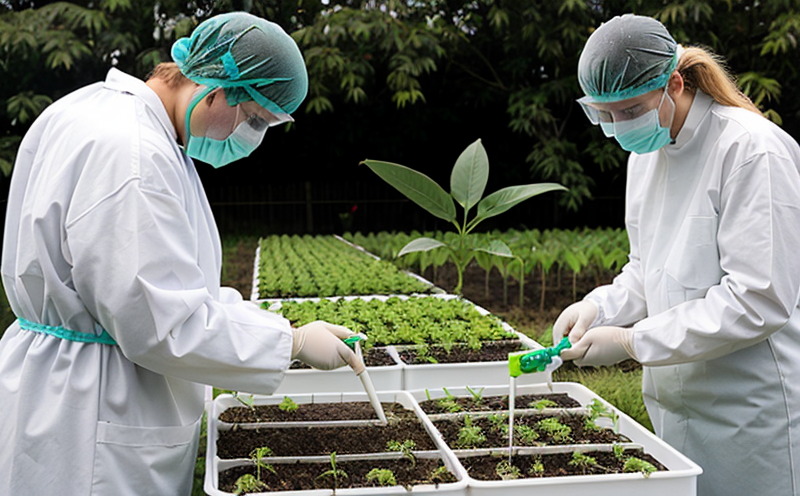Plant Pathogen Bioassay Testing
In the realm of agriculture and forestry testing, plant disease and pathogen testing is crucial to ensuring crop health and sustainability. Among these critical tests, Plant Pathogen Bioassay Testing stands out as a fundamental tool for identifying pathogens that can threaten plant life. This service involves assessing the viability and virulence of various pathogens using living plants or plant tissues as hosts.
The bioassay process begins with selecting suitable host plants that are known to be susceptible to specific pathogens. The specimens are carefully prepared under controlled conditions, ensuring uniformity in size, age, and health status. Once prepared, the plant tissue is inoculated with the pathogen of interest. The subsequent monitoring involves observing symptoms such as wilting, discoloration, or necrosis over a defined period.
The bioassay test not only aids in identifying pathogens but also helps determine their virulence and the effectiveness of potential treatments. This information is invaluable for developing strategies to mitigate disease outbreaks, improving plant resistance through breeding programs, and ensuring compliance with international standards such as ISO 16129 for biosafety.
One of the key advantages of this method lies in its ability to simulate real-world conditions, making it an essential tool for researchers and quality managers. By understanding how pathogens behave under controlled environments, we can better predict their potential impact on crops and forests.
The process also involves stringent quality control measures at every stage, from sample preparation to final analysis. This ensures that the results are reliable and reproducible, providing a robust basis for making informed decisions about plant health management.
- Identifies Specific Pathogens: The bioassay allows for precise identification of pathogens affecting plants, which is crucial for targeted treatment strategies.
- Evaluates Virulence: By determining the pathogen's ability to cause disease, we can better understand its potential threat and develop mitigation plans.
- Predicts Outbreaks: Monitoring bioassay results helps predict potential outbreaks, allowing for proactive management measures.
The bioassay testing service plays a vital role in maintaining the health of agricultural crops and forestry resources. It contributes significantly to global efforts towards sustainable agriculture by ensuring that crops are resilient against diseases, thus supporting long-term food security and environmental preservation.
For quality managers and compliance officers, this service offers a powerful tool for ensuring regulatory adherence and product safety. R&D engineers benefit greatly from bioassay data in their quest to develop new varieties of plants with enhanced disease resistance. For procurement professionals, understanding the results helps them select suppliers who adhere to stringent quality assurance protocols.
In summary, Plant Pathogen Bioassay Testing is an indispensable service for anyone involved in agricultural and forestry testing. Its ability to provide accurate insights into plant health and disease management makes it a cornerstone of sustainable practices in these sectors.
Benefits
- Precise Identification: Accurate identification of pathogens affecting plants.
- Evaluation of Virulence: Determination of pathogen's ability to cause disease.
- Prediction of Outbreaks: Early detection and prediction of potential disease outbreaks.
- Enhanced Sustainability: Contributing to the maintenance of plant health, thereby supporting long-term sustainability in agriculture.
- Regulatory Compliance: Ensuring adherence to international standards for product safety.
Environmental and Sustainability Contributions
The bioassay testing service plays a pivotal role in environmental sustainability by ensuring that crops are resilient against diseases. By identifying pathogens early, implementing effective management strategies, and minimizing the need for excessive chemical treatments, this service helps reduce the overall environmental impact of agricultural practices.
Through precise identification and evaluation of pathogen virulence, bioassay testing supports sustainable agriculture by enhancing crop resilience. This not only contributes to food security but also promotes healthier ecosystems. The service aligns with global efforts towards sustainability by providing robust data that can be used in breeding programs aimed at developing disease-resistant plant varieties.
By ensuring regulatory adherence and product safety, this service further reinforces the importance of sustainable agricultural practices. It supports the development of strategies to mitigate disease outbreaks, thereby reducing the need for chemical interventions that could harm biodiversity and water quality.
Competitive Advantage and Market Impact
The bioassay testing service offers a significant competitive advantage by providing accurate and reliable insights into plant health and disease management. This information is invaluable for researchers, quality managers, compliance officers, R&D engineers, and procurement professionals.
- Innovation in Crop Management: Provides data that can drive innovation in crop management strategies, leading to more efficient and sustainable practices.
- Enhanced Product Quality: Ensures that products meet strict quality standards, enhancing customer satisfaction and loyalty.
- Increased Efficiency: By predicting disease outbreaks, this service allows for proactive measures that can prevent costly losses due to plant diseases.
The market impact of bioassay testing is profound as it contributes to the overall health and productivity of agricultural crops. This, in turn, supports the broader economy by ensuring food security and reducing reliance on chemical treatments. The service also enhances the reputation of companies that adhere to stringent quality assurance protocols.
By leveraging bioassay data, businesses can differentiate themselves from competitors through superior product quality and sustainability practices. This not only enhances market position but also fosters long-term relationships with customers and suppliers who prioritize ethical and sustainable business practices.





